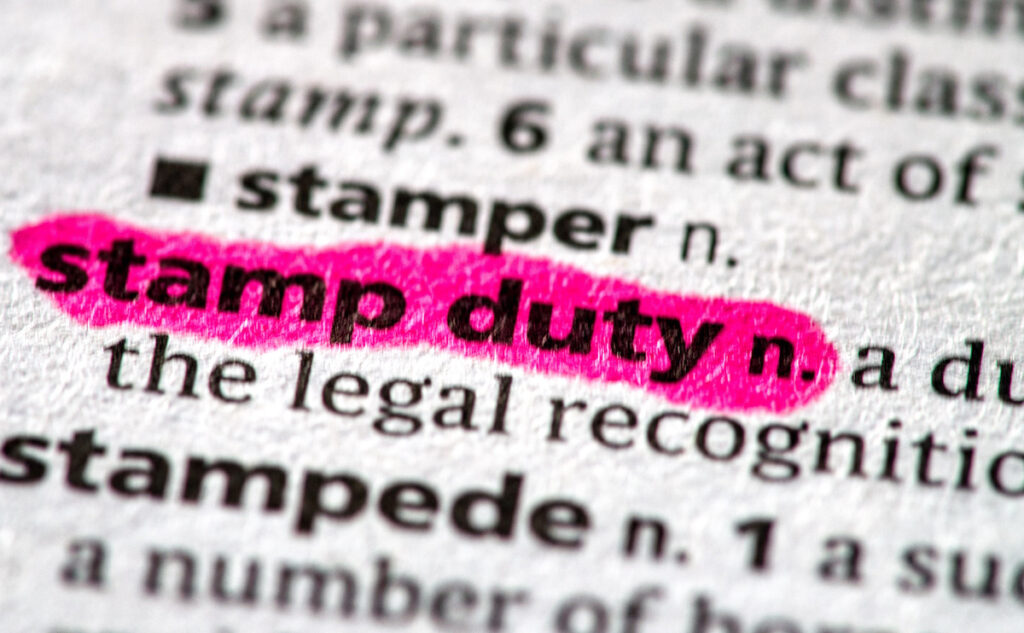What you need to know about Stamp Duty when you buy a property.

Updated with temporary England and Northern Ireland Stamp Duty changes valid from 23 September 22 to 31 March 2025.
When you’re thinking about buying a home, you’ll come across Stamp Duty Land Tax (SDLT) – or just Stamp Duty for short. This is a tax you might have to pay if you buy a residential property or piece of land in England or Northern Ireland.
The tax you pay depends on:
- If you’re a first-time buyer or current homeowner
- How much the property costs
The tax applies to both freehold and leasehold properties, whether you’re buying it with cash or a mortgage.
If you’re buying a house in Scotland, you’ll pay Land and Buildings Transaction Tax (LBTT) and in Wales it’s Land Transaction Tax (LTT) instead of Stamp Duty.
How much is Stamp Duty?
There are several rate bands for Stamp Duty.
Unless you’re a first-time buyer, you’ll pay this tax on the purchase of your main property costing more than £250,000.
Stamp Duty for first-time buyers
First-time buyers in England and Northern Ireland don’t pay Stamp Duty on properties that cost up to £425,000 and pay 5% on the portion from £425,001 to £625,000. There is no relief on properties over £625,000 or on buy-to-let properties. You’re eligible if you and anyone else are buying with are first-time buyers.
In Scotland, the starting threshold for first-time buyers is £175,000. There is no first-time buyer relief in Wales.
Current Stamp Duty rates for first-time buyers
| Minimum property price | Maximum property price | Stamp Duty rate |
| £0 | £425,000 | 0% |
| £425,000 | £625,000 | 5% |
If the property price is over £625,000, you cannot claim the relief.
From September 2022, first-time buyers became exempt from Stamp Duty on properties up to £425,000.
You won’t need to do anything to qualify for the first-time buyer exemption. Your conveyancing solicitor will ensure you meet the appropriate criteria.
To qualify for the first-time buyer Stamp Duty exemption:
- You must be a first-time buyer
- You are buying a home that you will live in
- Your property is below £425,000 for no Stamp Duty fee at all
- Your property is under £625,000 – you’ll pay Stamp Duty on the amount over £425,000
- Your property is not in Scotland or Wales
A first-time buyer:
- Cannot have ever owned a property, even if you have now sold it (this includes inheritance)
- You cannot have owned property abroad
- If it’s a joint purchase, both partners must be first-time buyers
- However, you can own commercial property
Current Stamp Duty rates for homeowners
| Minimum property price | Maximum property price | Stamp Duty rate | Stamp Duty rate for additional properties |
| £0 | £250,000 | 0% | 3% |
| £250,000 | £925,000 | 5% | 8% |
| £925,000 | £1,500,000 | 10% | 13% |
| Over £1.5 million | – | 12% | 15% |
For example, if you buy a house for £350,000, the Stamp Duty you owe will be as follows:
- 0% on the first £250,000 = £0
- 5% on the portion from £250,001 and £350,000 = £5,000
Total STLD you need to pay = £5,000
How do you pay Stamp Duty?
In practical terms, your solicitor or conveyancer will generally deal with Stamp Duty on your behalf. They will tell you how much you owe with the most up-to-date rules. They tend to submit your return and pay the amount due on the date of completion, and either add the amount to their fees or collect the amount from you in advance.
Stamp Duty must be paid within 14 days of completing on the property.
Can you avoid paying Stamp Duty?
While Stamp Duty is another cost to factor in when buying a house, it is a must to pay. However, there are some exceptions that mean you won’t need to pay. These include if:
- The property is left to you in a will
- The property is transferred because of divorce or dissolution of a civil partnership
- You buy a freehold property for less than £40,000
- The property is given to you as a gift or transferred with no money or other payment exchanging hands
- The property is a holiday lodge – any property that is moveable is exempt
- The property is a houseboat (unless the houseboat comes with a large garden). Only purchases that use land space are taxable
Be sure to discuss this with your conveyancing solicitor to ensure you have the right, most up-to-date advice.
Be sure you’re ready for all the house-buying costs, including factoring in any Stamp Duty fees you need to pay. Start by calculating your house budget.